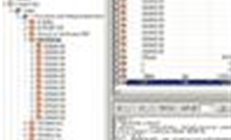test

Review: NetIQ WebMarshal
NetIQ's WebMarshal now supports all versions of Windows server. The installation is simple, but you need an SQL server on the network. While this means that you have to factor this cost into the purchase, it means you can distribute the WebMarshal install for better performance and scalability. You can also run the database on the same PC, as we did for our test.

Review: Pearl Echo
Pearl Software's Echo 6 works in a slightly different way to the other products on test. Rather than blocking web traffic at the gateway, Echo uses a client/server approach. The server dictates the policy, while clients installed on each PC control internet access locally. While the server is very quick and easy to install, there's quite a lot of leg work involved in distributing the client to all of your network's computers.

Review: SurfControl Web Filter
SurfControl's Web Filter is, perhaps, the best known web filtering product on the market. We reviewed the Windows version of the product, but there are also versions available for Cisco CE, Check Point, Microsoft ISA and several third-party appliances, including Blue Coat and Finjan, both in this test. The standard Windows version is flexible – but you will need one copy of the filter per network.

Review: Adobe LiveCycle Policy Server
Policy Server appeared with the release of Acrobat 7 earlier this year. It builds substantially on the encryption and password security of past editions of Acrobat and provides control over how Acrobat PDF format documents are accessed.

Review: Policy Commander
Configuring the security settings on Windows servers, desktops and notebooks is an overly complex chore. Ensuring that the users do not reset any of the settings just adds to the headache. Policy Commander automates this task using predetermined policies.

Review: UNIX Privilege Manager
In the Unix world, anyone who knows the root password has access to the root account. This gives them complete control, as there is no way to delegate specific privileges. The systems admin has to decide to control everything, or allow other users root access to perform specific tasks allocated to them. One way leads to overwork, the other to security compromise.

Review: Websense Enterprise
This suite of programs is designed to control access to the internet and keep the enemy at bay. It integrates with many third-party defense applications to offer a war room in a browser from which the state of the defenses can be examined, as well as dictating how the various units work together to shield the internal network.

Review: ProDiscover Incident Response
This product is the big brother of its family, including all the forensic capabilities of other versions with the additional ability to conduct investigations over the network and compare live systems to known-good baselines to establish whether a machine has been compromised or tampered with.

Review: Stellar Phoenix FAT & NTFS
Stellar Phoenix is a product aimed at data recovery, rather than strict forensics, although of course recovery is an important part of incident response. Confronted with a disk with damaged or missing data, the software will attempt to recover information and reconstruct partial data.













